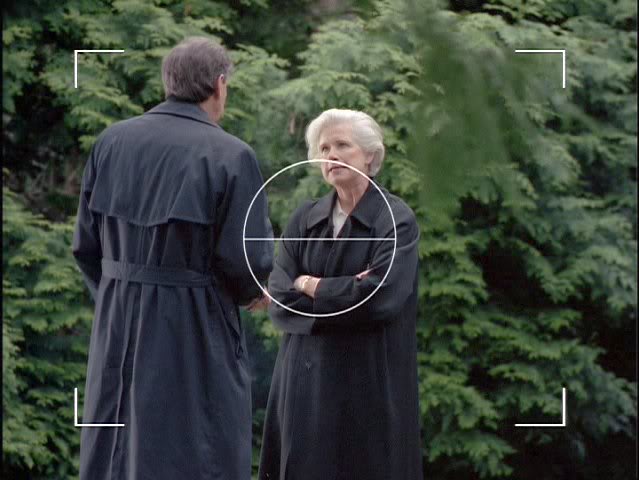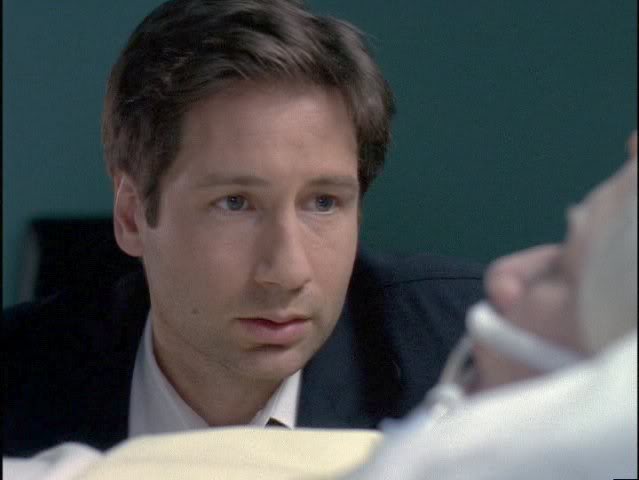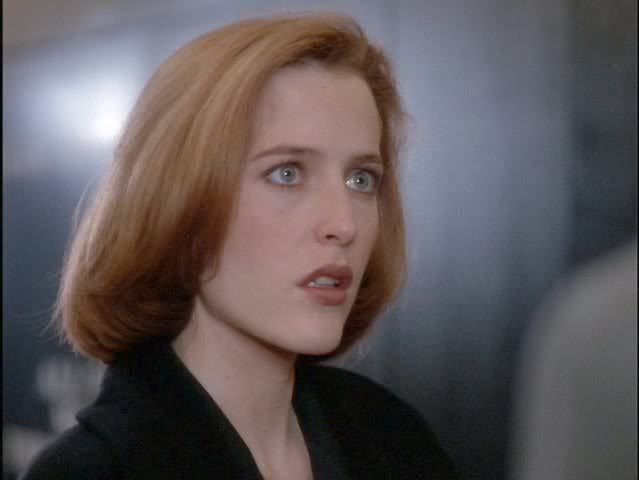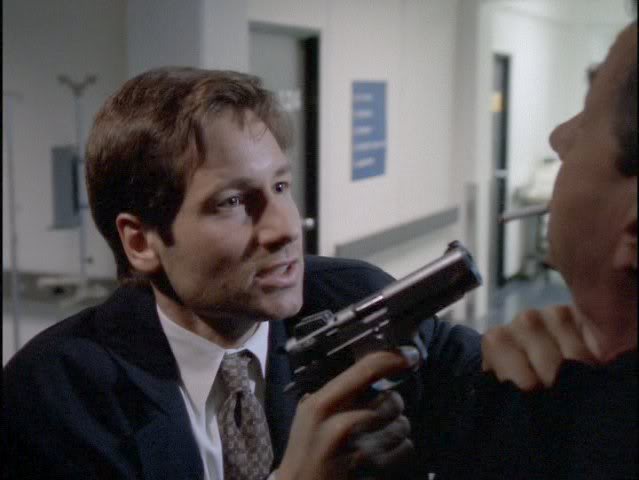CTP Episode of the Day - 06.12.06
Today's Cherished Episode: Talitha Cumi (3x24)
Original Air Date: May 17, 1996
Written By: Chris Carter
Story By: Chris Carter and David Duchovny
Directed By: R. W. GoodwinMulder and Scully search for a mysterious man with the power to heal whose existence risks exposing a conspiracy involving the presence of aliens on Earth, while various forces seek a strange weapon that comes into Mulder's possession.
(Thanks to chrisnu for today's episode pics.)
"Men can never be free, because they're weak, corrupt, worthless and restless. The people believe in authority, they've grown tired of waiting for miracle or mystery. Science is their religion. No greater explanation exists for them. They must never believe any differently if the project is to go forward."
Some "Talitha Cumi" Tidbits & Musings:
-- It became a tradition (and sort of a good luck charm) for Director R. W. (Bob) Goodwin to direct the season premiere and the season finale of each season. He directed every season finale for seasons one through five, and every season premiere for seasons three through five. He also directed "One Breath" and "The Blessing Way." Goodwin said he preferred the first and last directing assignments to "break the crew in" and because he could put all his energies into the final episode of the year. His last directing assignment was the last episode filmed in Vancouver, "The End." Goodwin is married to Sheila Larkin who played Maggie Scully.
-- Roughly two months before the Season 3 finale aired on May 17, 1996, Chris Carter and David Duchovny blocked out aspects of the story they wanted to tell in "Talitha Cumi." There were a number of themes that the two wanted to hit upon -- most significantly a sequence inspired by The Grand Inquisitor in The Brothers Karamazov by Fyodor Dostoyevsky, where God returns to Earth during the Spanish Inquisition. As conceived by Carter and Duchovny, the Cigarette Smoking Man would interrogate an alien visitor with strange healing powers, creating a Christ-like biblical analogy. The original story had Christ returning and healing a young girl, only to be told by the aged Inquisitor that he's no longer welcome on Earth. In similar fashion, CSM would tell the Healing Man that people want authority, not faith, and in his own skewed view of the world, need to be safeguarded from freedom. The prison cell dialogues between Jeremiah Smith (the Healing Man) and CSM are based directly on the classic Grand Inquisitor scene. In the final script, CSM paraphrases the Inquisitor when he says, "Anyone who can appease a man's conscience can take his freedom from him."
-- "I suggested the Grand Inquisitor for the first episode Chris and I worked on together, which was 'Colony'," Duchovny explained. "It got away from me and it turned into something else -- 'Colony/End Game' -- which I thought was really good, but it wasn't the idea." According to Duchovny, as the character of CSM developed, he naturally began to fit the profile for such an endeavor. "It made sense for him to become the Grand Inquisitor -- this kind of cynically heroic character. He's like Nietszche's Socrates -- he's the rational man saving the masses from their own imagination. I can't take credit for Dostoevsky," Duchovny continued. "I can just take credit for having been educated well. If it drives people to read that, that'd be great. But just read that part. It's short. Don't read the whole Brothers K." Carter agreed with Duchovny's idea about CSM, especially since the show had evolved and gone in directions he hadn't anticipated when he wrote the pilot. Carter never anticipated that CSM would be speaking this much in the show, if at all.
-- Participating in the show's creative direction helped keep Duchovny engaged in the process, but he rejected the notion that The X-Files' popularity and his celebrity contributed to his ability to influence such matters. "I don't think the success of the show has anything to do with that. Right from the beginning, Chris and I have had a very reciprocal dialogue about where the character should go and what the show's about. Either he listens to me or he's very smart and makes me think that he listens to me."
-- The title chosen for the episode means "Arise Maiden" in the ancient Aramaic language and comes from the Gospel of Mark (Mark 5:41), where Jesus raises a girl from the dead by calling out in Aramaic, "Talitha, cumi." The phrase recurs in The Grand Inquisitor from The Brothers Karamazov, as noted above, when Jesus returns to earth and again raises a dead child to life, thereby attracting the attention of the Grand Inquisitor.
-- The Grand Inquisitor scene was filmed on a prison set originally constructed for "The List."
-- David Duchovny met actor Roy Thinnes on a plane and suggested to Carter that he would be very good as Jeremiah Smith. Thinnes was quite familiar with aliens, even shape-changing ones, having played David Vincent in Quinn Martin's classic sci-fi/paranoia series, The Invaders (1967-1969).
-- In the scene where Jeremiah Smith morphs into the likenesses of Deep Throat and Bill Mulder, he was originally supposed to morph into Melissa Scully as well, but actress Melinda McGraw was unavailable for filming of the episode, so that idea was scrapped.
-- Chris Carter directed Jerry Hardin (Deep Throat) in the scenes where Jeremiah Smith morphs into Deep Throat.
-- The name of the restaurant where this episode begins is "Brothers K" -- another reference to The Brothers Karamazov.
-- The scene that takes place in the "Brothers K" restaurant was actually filmed in an A&W fast-food restaurant in Vancouver. The same restaurant was used to film the teaser in "Oubliette."
-- Extras that appear in the teaser scene in the restaurant include cinematographer John Bartlett's daughter, first assistant director Tom Braidwood's daughter, key grip Al Campbell's daughter, and three of stunt coordinator Tony Morelli's children.
-- Although Mulder's relationship with his mom deteriorates as the series progresses, it was still loving and protective back in Season 3. Duchovny does a great job expressing his feelings without words: the brief pause and the look on his face when he enters his mother's hospital room for the first time, trying to hold it together while falling apart; the sweet smile when she wakes up; and the breakdown and holding her hand to his face when he visits her later in the episode. Director Bob Goodwin remarked that Duchovny did some of his best work (up to this point) in this episode.
-- Similarly, the understated "thanks" and "are you okay?" between the two partners is a great example of the "less is more" philosophy. The scene is quietly delivered, but powerful in defining the relationship and caring between these two characters.
-- Oopsie! In the scene where Mulder first visits the house in Quonochontaug (and talks with X), he gets paint on his cost when he brushes against the door going through it, but the stain miraculously disappears halfway through the scene.
-- The lobby of Vancouver City Hall was used as the location for the Social Security building lobby in Washington, D.C.
-- There are two 11/21 references in the episode (11/21 is Chris Carters' wife's birthday). When Mulder visits his mother in the hospital, the time is 11:21; and when Scully finds the multiple pictures of Jeremiah Smith on her computer, the time at the bottom of the screen is 11:21 (though not the same day as the other reference).
-- An in-joke in the episode is CSM mentioning that he's a good water skier. In reality, William B. Davis, who plays CSM, is a championship-level water skier. During pre-production on the episode, there was some talk of actually having Davis water ski, but they settled for the reference instead.
-- Bill Davis received short notice that he had a significant role in "Talitha Cumi," so he had to get a substitute to take over his teaching duties at the acting school he ran; but he felt like he was "on holiday, getting to be an actor for a couple of weeks." He wasn't even disconcerted to learn that the script divulged that CSM had cancer, noting "David says I'm going to recover."
-- Jeremiah Smith is kept prisoner in room B18, a reference to Building 18, the location where many Roswell tourist items are housed.
-- During the inquisition, CSM says "The date is set." Well, at least CC didn't forget that little detail at the end. But he did forget one of the most important things that Jeremiah Smith had to say: "You can't kill their love, which is what makes them who they are, makes them better than us, better than you." To me, this was the perfect reason for the whole pregnancy story; no matter what the aliens do, they can't destroy love (which creates little beings like William) because this is what makes humans better than aliens and this is what ensures that the human race will survive.
-- No one was completely sure how to pronounce "Quonochontaug," so during pre-production, a call had to be placed to Rhode Island to get the correct pronunciation.
-- Mulder's path of destruction through the Quonochontaug summer house is quite an eye-opener about the Mulder family. First, what's up with the mirror over the kitchen sink? Who wants to look at themselves while they do the dishes? And boy are there a *lot* of coffee mugs in the cabinets; must have had a lot of Consortium Club meetings at the old summer house. A spoon collection? That's just spooky. What is the owl-shaped thing on the wall of the bedroom? And it looks to me like *none* of the Mulders ever set foot in that house again after the divorce, since they didn't even bother to pack up their clothes.
-- During development of the script and discussion of character motivation, Frank Spotnitz asked Chris Carter why Bill Mulder would stash away the alien stiletto or why he would leave a device of such potential importance at a house he once shared with his ex-wife. "Why did he keep this thing? Protection?" Spotnitz asked. "Nostalgia," Chris Carter replied.
-- X-Files production assistant Angelo Vacco had a small part in this episode, as one of the gunshot victims who was miraculously healed. Vacco also had small roles in "F. Emasculata," "Milagro," and "Improbable."
-- Gillian Anderson's stand-in Bonnie Hay plays the hospital nurse in this episode, representing her fifth appearance on the show. She also portrayed a nurse in "D.P.O.," a doctor in the "Colony/End Game" two-parter, and a therapist in "Oubliette." When it was pointed out that she seemed to keep finding herself playing some sort of health-care provider, Hay concluded, "I guess I look caring and helpful."
-- Hrothgar Mathews, who played the restaurant shooter, also appeared in "Our Town," "The Host," and "Jersey Devil." John Maclaren, who played Mrs. Mulder's doctor, was George Kearns in "Our Town." Stephen Dimopoulos (Detective) also appeared in "Dod Kalm."
-- Several key references in "Talitha Cumi" relate back to earlier episodes, most obviously "Colony/End Game." X's statement that those who oppose Mulder would risk killing him and turning him into a martyr also refers to an exchange in "Ascension" when CSM explains that fear of allowing Mulder's work to become a crusade is what prevents the forces with which he's aligned from killing the agent.
-- "I should shoot you right here, but they probably would be able to save you." One of my favorite Mulder lines.
-- The exchange between Mulder and CSM, when CSM mentions knowing the agent's mother before he was born, not surprisingly generated considerable speculation even within the show as to whether the shadowy character -- in a Star Wars-like twist -- might really be Mulder's biological father. David Duchovny considered that a very real possibility in adding to the series' epic mythology; he talked to Chris Charter about it, noting that "Once CSM started becoming a real character, that became an option." He also noted that the Star Wars analogies were a bit misguided, given that George Lucas borrowed from a wide variety of myths in developing his series, and that the source could be any one of a dozen stories. William B. Davis said that he had contemplated the scenario that CSM was Mulder's father in the past and that such thoughts were guiding him in part when he played the scenes in this episode.
-- FOX's concern about violent content in TV programming resulted in the fight between Mulder and X being trimmed to comply with FOX's broadcast standards department. Even with stunt doubles doing much of the work, Steven Williams (X) wrenched his shoulder during the filming, prompting director Bob Goodwin to treat the actor to the services of a masseuse afterwards.
-- The alien stiletto worked using a pneumatic tube by running a hose up the actor's sleeve to trigger the device. The stiletto's sound effect was again provided by producer Paul Rabwin -- vocally making a "pffft" sound -- as he did with its first use in "Colony/End Game." Rabwin made the sound after a technician spent hours putting together an effect that didn't quite cut the mustard. Paul Rabwin calls that oft-told anecdote, "My claim to fame."
-- Although there were several more days of filming left to go (including the Inquisitor scene which was filmed on the final day), the last scene filmed by Gillian Anderson and David Duchovny was the scene in the fast-food restaurant parking lot after the shooting. David Duchovny quite literally rode off into the sunset when the day's shooting was done to begin filming "Playing God."
-- By sheer coincidence, the season finale of NBC's Homicide: Life on the Street -- which aired on the same night in the hour immediately after The X-Files -- opened with the aftermath of a multiple shooting in a fast-food restaurant.
Please share your first impressions, favorite (or cringe-worthy!) moments, classic lines, favorite fanfic, nagging questions, repeated viewing observations, etc., as today we celebrate "Talitha Cumi"!
Polly



